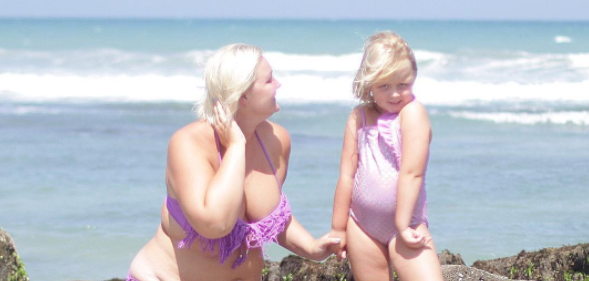Allison Kimmey's Body Positive Parenting Tips

Allison Kimmey, 30, is a self-help author and rad Instagrammer. She’s gone viral a few times over the past years for her body-positive parenting posts, but her June 11 one really struck a chord: After explaining her 4-year-old daughter called her fat because she was mad at her for saying she had to get out of the pool, Kimmel’s response has more than 32,000 likes.
Their conversation, which can be read in full in the caption above, ended like this:
Me: "let's talk about it. The truth is, I am not fat. No one IS fat. It's not something you can BE. But I do HAVE fat. We ALL have fat ... Do you have fat?"
Her: "yes! I have some here on my tummy"
Me: "that's right! So do I and so does your brother!"
Her brother: "I don't have any fat, I'm the skinniest, I just have muscles"
Me: "Actually everyone, every single person in the world has fat. But each of us has different amounts ... Some people have a lot, and others don't have very much. But that doesn't mean that one person is better than the other, do you both understand?
Both: "yes, mama"
Kimmey told Cosmopolitan.com via email this isn’t the first time she’s had to broach sensitive subjects with her kids: “One of the first [hard] conversations I had to have was with my daughter [was about a year ago] about not having to wear makeup in order to be pretty, or with my son that just because you can't see your friends muscles doesn't mean they aren't strong."
She believes this particular post went so viral because “the conversations with my children that I share seem to really empower women to feel like they can teach their children to accept all bodies, including their own.” That said, she says she never expects to go viral and that she's only 'gramming with the purpose of spreading self-love.
To parents who might find themselves in similar situations but are unsure of how to handle it, Kimmey suggests taking a moment to consider what your child actually said. “I always begin by asking them what they meant by their statement or if they understand what a particular word means. Usually it turns out they mean something completely different,” she says. “And from there we break it apart more, I lead with questions for them and that provides an opportunity for me to help them get the answer themselves and empowers their belief system.”
🙌 🙌 🙌
Follow Tess on Twitter.
You Might Also Like

